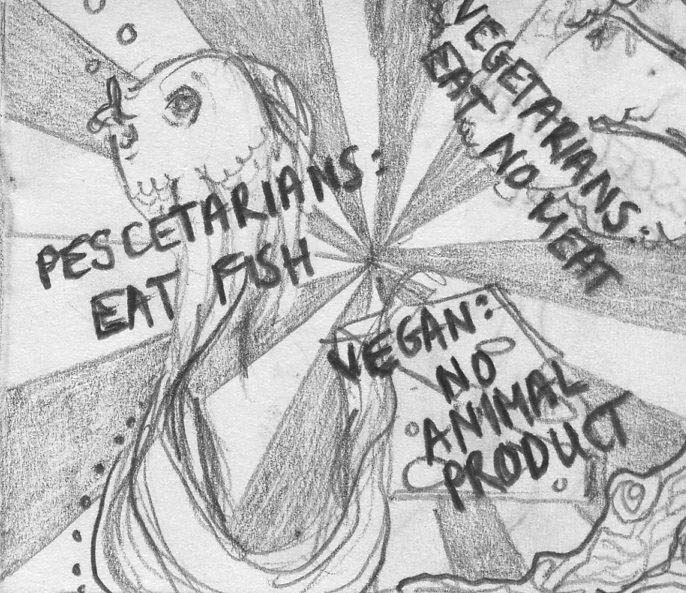Vegetarianism doesn’t indicate conceit; intentions vary
November 4, 2016
If you’ve ever found yourself annoyed by people sporting “I’m a vegetarian” as a badge of moral high ground, you’re not the only one. Good or bad, diet choices can bring heated moral implications to the table.
Vegetarians. They’re often mocked, written off, type-cast, and invalidated. But why do we criticize each other’s diets so readily?
The short answer is that vegetarians can often make meat eaters feel bad. The assumption is that all vegetarians are out to advocate for animal rights and are high-key hypocrites, not eating meat while, for example, still drinking milk from farmed cows (not always the case).
I personally have been through the assumed “teenage girl phase” of wondering if I think killing animals for our consumption is moral or necessary. Three years ago, I stopped eating meat.
However, while I chose to cut out chicken, beef and other animals, I kept fish, making me a pescetarian. Cases like mine can seem inconsistent and non-vegetarians could understandably argue: who are you to decide which animals are ethically OK to eat or not?
One part of the feud is lent to the assumption that the only reason someone would be a vegetarian is for animal rights. Animal rights is one, but not the only respectable reason to modify a diet.
In fact, according to polls by the Harris Interactive Service Bureau, in which 5,050 people were surveyed, an estimated 54 percent of vegetarians cite animal welfare as a reason for the restriction, while 53 percent claim personal health as a leading factor and 47 percent cite environmental concerns.
For example, while my being a pescetarian was initially sparked by a moral concern, I eat fish for health reasons, and my main incentive is actually the environmental implications of the beef industry.
According to the Food and Agriculture Organization of the UN (FAO), about 14.5 percent of the world’s greenhouse gas emission comes from the production of livestock. The less we demand, the less we need to farm.
But the discord between vegetarians and meat eaters is also a moral accusation: that nobody is a true vegetarian, and animal products are an inseparable aspect of American life… a true fact.
For me, pescetarianism is a compromise of morals. I feel better knowing that I may be lessening the effects of an industry that is innately harmful to the environment, even though I admittedly still contribute to an industry that may be overfishing the seas. And there’s the catch.
For whatever reason you decide to restrict your meat intake (moral, health or environmental), there’s never a way to do it completely. You might not eat beef, but still drink milk from farmed cows. You might not eat fish, but still drive a fossil fuel-burning car. It’s easy to target the people trying to do better simply by saying they can never do it completely, but that’s not right.
Here’s my opinion: if you can’t do something entirely, save every animal from death by man, remedy every problem that faces the environment, that should never stop you from doing as much as you possibly can anyways.
I restrict my diet for the environment, even though I still buy clothing that was probably made in a factory that runs on petroleum, which harms the environment. I do it even though I use a heater in the winter and drive a car, even though the environment is still in danger after the effort’s been made.
I am still part of the problem. It’s almost impossible not to be. But by eating less meat, I can try to address my concerns as much as I can.
I try to be careful about preaching, because it shouldn’t be about superiority. I don’t set out to exemplify myself as the picture of activism, though I understand there might be some who do… and that’s understandably uncool.
But if you simply ask vegetarians why they do it, it’s then on you whether or not you agree with those concerns. And, if you find that you do, rather than invalidate those who made you aware of the issue, ask yourself: what are you willing to do about it?



